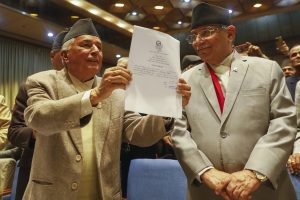On February 27, the Khadga Prasad Sharma Oli-led Communist Party of Nepal-United Marxist Leninist (CPN-UML) withdrew its support for the Pushpa Kamal Dahal-led government. The CPN-UML ministers resigned en masse, bringing down the curtain on the seven-party coalition government that was formed in Nepal barely two months ago.
To start with, this was a coalition of strange bedfellows, with parties with opposing agendas and ideologies coming together. Their lust for power was their common agenda.
Prime Minister Dahal will likely continue to lead the next government with the support of the Sher Bahadur Deuba-led Nepali Congress (NC) and six smaller parties. This marks a return to the pre-poll alliance of 2022.
Differences over the election of the new president, scheduled for March 9, provided the immediate cause for the downfall of the coalition government. In a power-sharing agreement between Dahal and Oli, the former had agreed to support the CPN-UML’s presidential candidate. However, Dahal reneged and decided to support the NC’s candidate instead.
The president is the ceremonial head of state, who is to perform all functions “on the recommendation and with the consent of the council of ministers.” However, the presidency has effectively become a permanent, untouchable veto-wielding power. Elected for five years by an electoral college, the president can only be impeached by a two-thirds majority of the Parliament, a number beyond the current fractured coalitions in Nepal. Therefore, current President Bidhya Devi Bhandari faced no consequence for approving the dissolution of the parliament twice, despite the Supreme Court reinstating parliament both times, and holding off approval of the citizenship bill despite a constitutional mandate.
Oli is miffed at Dahal’s intransigence. He knew he would control all the government strings if the president was his lieutenant. He headed the largest party in the coalition by a mile; his party leads both houses of parliament and the commissioners of many constitutional committees are his acolytes. Dahal, though the prime minister, would have been a lame duck.
That was obvious to Dahal too.
Dahal was able to play the NC and CPN-UML to remain at the center of Nepali politics despite his party winning only 29 of 275 seats in the federal parliament. That the NC voted to support his government earlier this year, despite Dahal ditching it at the last minute during government formation, did not go unnoticed.
Sources close to Dahal argue that he was taken aback after Oli showed no remorse for his attempts to dissolve the Parliament twice in 2020 and 2021 during the parliamentary address.
Dahal and Oli do not share a cordial personal relationship. Oli’s CPN-UML and Dahal’s Communist Party of Nepal-Maoist Center (CPN-MC) merged to form a powerful Nepal Communist Party in 2018, with the two as co-chairs. However, the union barely lasted for two years because of the rift between the two leaders. They clashed in the public domain, attacking each other personally.
Their coming together after the 2022 elections to form a government was instrumental and not a rekindling of their relationship. Dahal’s interest in being the prime minister and Oli’s interest in breaking the NC and CPN-MC coalition led to their partnership. However, the coalition shattered as soon as interests diverged again.
Meanwhile, Deuba maintained a dignified silence and did not criticize Dahal even after the Maoist leader “betrayed” him to form the government with Oli’s support.
After pulling out support, the CPN-UML has insinuated that Dahal came under “foreign influence.” CPN-UML General Secretary Shankar Pokharel said that “external powers did not prefer the current government [of which CPN-UML was a part], and were potentially instrumental in the government change.” India and the United States were especially active this time, he observed, noting that “the [foreign] power centers did not want the CPN-UML to dominate the government.”
Visits by India’s Foreign Secretary Vinay Mohan Kwatra and four retired army generals in February and the flurry of visits by U.S. officials lend some credence to the allegations. The U.S. Central Intelligence Agency (CIA) chief had also requested to visit Nepal, but the Nepali government felt it was not an appropriate time.
According to some analysts, India prefers a “controlled chaos” in Nepal. A strong and unified government in Nepal is not seen by officials in the Indian Ministry of External Affairs or its embassy in Nepal to be in India’s interest.
Additionally, the India-Nepal relationship was at its lowest ebb during Oli’s reign (2018-21) over the territorial dispute between the two countries. Although India and the U.S. are much closer than they were in the past, especially when it comes to China, New Delhi is concerned about increased and direct U.S. engagement in Nepal because it undercuts Indian influence in Nepal.
Nepal’s increased geostrategic importance and the implementation of the Millennium Challenge Corporation (MCC), a $500 million grant for infrastructure projects, has led to the increased U.S. presence. With the NC set to join the government, it brings into power the coalition that ratified the MCC in February last year.
There is no denying the role of external powers, but it would be foolhardy to discount the role of the personal vested interests of key Nepali leaders in Nepal’s current political instability. The lust for power is the main reason why Dahal left his electoral alliance partner, the NC, and formed a government with the support of the CPN-UML. It explains why Oli assured Deuba that he would not support Dahal for prime minister till the last moment, only to do a volte-face. These are merely the results of instrumentality where the only currency is power. Because the leaders do not want to spell this out publicly, they hide behind blaming “hidden interests” and “external powers” for the political instability.

































